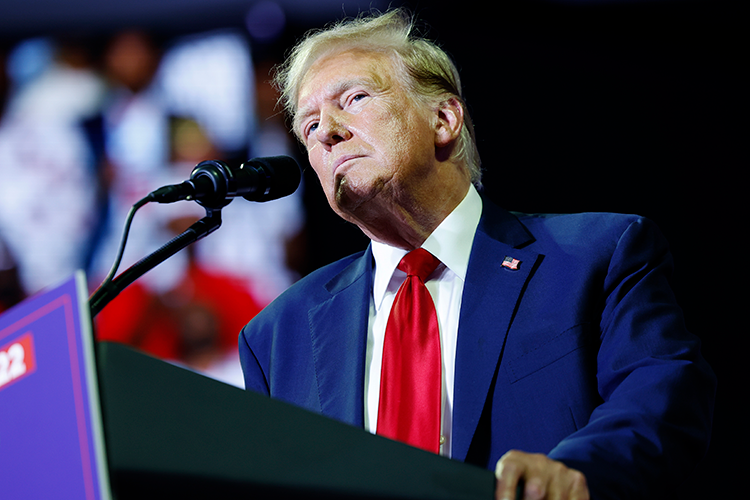Law Firms
Paul Weiss leader cites potential ‘existential crisis’ as 1 reason for Trump deal; critics include 141 firm alumni
An executive order targeting Paul, Weiss, Rifkind, Wharton & Garrison “could easily have destroyed our firm,” the law firm’s chairman, Brad Karp, told employees in a March 23 statement defending the deal that he reached with President Donald Trump. (Photo by Anna Moneymaker/Getty Images)
An executive order targeting Paul, Weiss, Rifkind, Wharton & Garrison “could easily have destroyed our firm,” the law firm’s chairman, Brad Karp, told employees in a March 23 statement defending the deal that he reached with President Donald Trump.
Karp’s message, printed by Original Jurisdiction, said Paul Weiss was facing an “existential crisis” as a result of a March 14 executive order by Trump. The order had suspended security clearances held by people at the firm, restricted their access to government buildings, required government contractors to disclose whether they do business with the firm, and required agencies to take steps to terminate contracts with Paul Weiss or its clients.
The executive order is being revoked as a result of the deal, Trump announced in a post on Truth Social, his social media platform, March 20. According to Trump, the deal provides that Paul Weiss:
• Will not deny representation to clients because of lawyers’ personal political views.
• Will take on a wide variety of pro bono matters that represent the full spectrum of political viewpoints.
• Will dedicate $40 million in pro bono legal services “to support the administration’s initiatives, including: assisting our nation’s veterans, fairness in the justice system, the president’s Task Force to Combat Antisemitism and other mutually agreed projects.”
• “Affirms its commitment to merit-based hiring, promotion and retention and will not adopt, use or pursue any DEI policies.”
Karp sent a copy of the agreement to firm employees that differs from Trump’s description, the New York Times reports. Karp’s version does not mention DEI, but it did affirm a commitment to merits-based employment practices and to hire an outside expert to audit those practices.
Karp also said under the agreement, “the administration is not dictating what matters we take on, approving our matters or anything like that.”
The Truth Social post also quoted a White House statement that said Karp had “acknowledged the wrongdoing of former Paul Weiss partner Mark Pomerantz,” who worked on a criminal case against Trump while he was with the New York district attorney’s office. But Karp’s copy of the agreement did not mention Pomerantz, who has denied doing anything wrong, according to the New York Times.
Karp negotiated the agreement just a few months after suffering a heart attack, the New York Times reports in another article. The deal was supported by “the vast majority” of the firm’s partners, the New York Times said, which relied on anonymous sources.
Karp said he was initially “hopeful that the legal industry would rally to our side” after Trump issued the executive order. Instead “certain other firms were seeking to exploit our vulnerabilities by aggressively soliciting our clients and recruiting our attorneys,” he said.
Paul Weiss initially planned to challenge the executive order in a lawsuit, but it soon became clear that a successful legal challenge “would not solve the fundamental problem, which was that clients perceived our firm as being persona non grata with the administration,” Karp said. In reaching a deal, Karp said, “we were guided by our obligation to protect our clients’ interests” and the need to ensure that the firm would survive.
Critics of the deal include 141 Paul Weiss alumni who signed a March 24 letter protesting the firm’s decision, according to a March 24 press release.
“We expected the firm to be a leader in standing up for the legal profession, the adversary system and the right to counsel,” the letter said. “Instead of a ringing defense of the values of democracy, we witnessed a craven surrender to, and thus complicity in, what is perhaps the gravest threat to the independence of the legal profession since at least the days of Sen. Joseph McCarthy.”
Taking the other side is Stephen Gillers, a professor at the New York University School of Law, who told Law.com that Paul Weiss “had no obligation to fight Trump in court.”
The firm “has obligations to its clients, who must deal with the federal government regularly as an adversary or a regulator, and to its thousands of employees, including lawyers,” he said.
Write a letter to the editor, share a story tip or update, or report an error.
